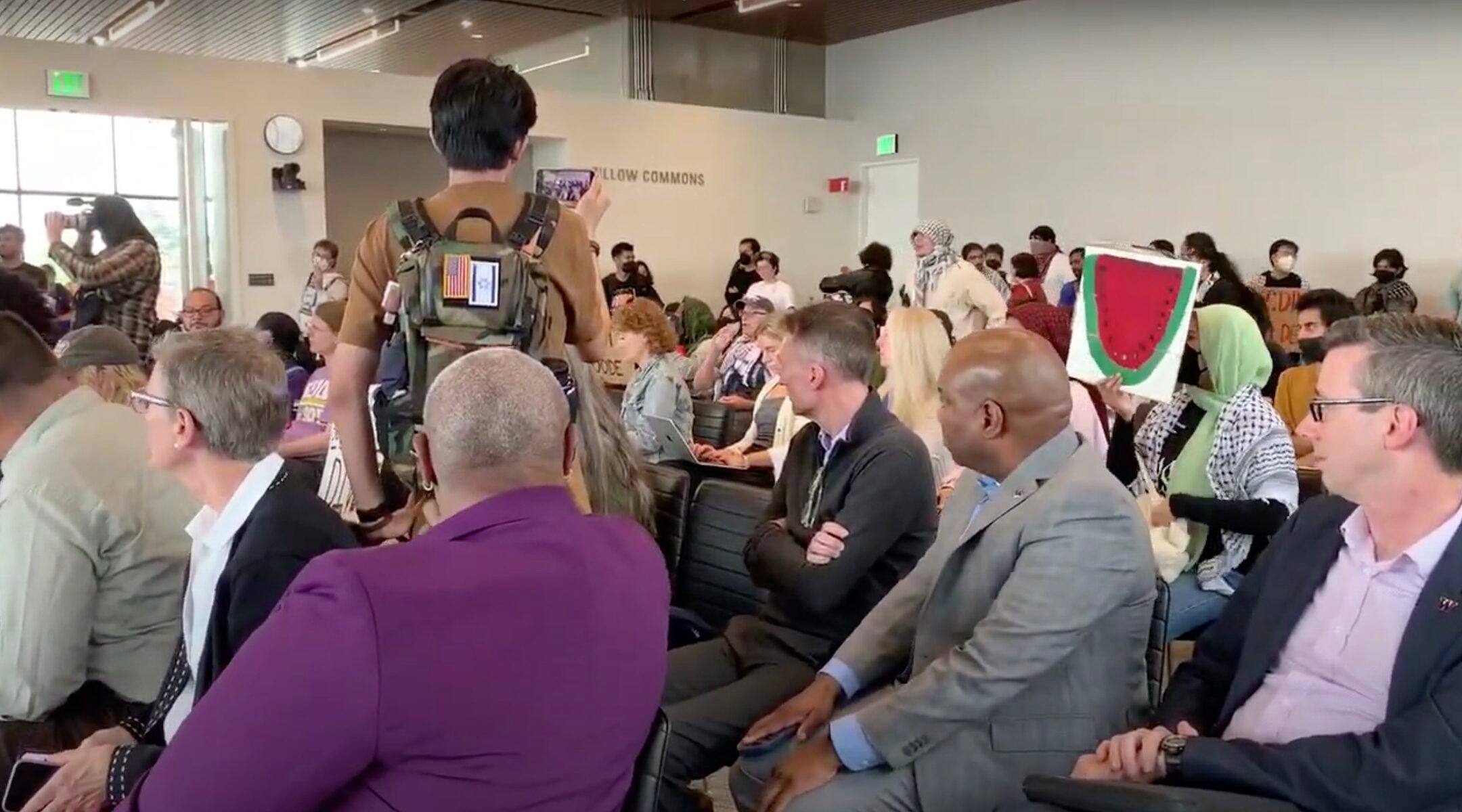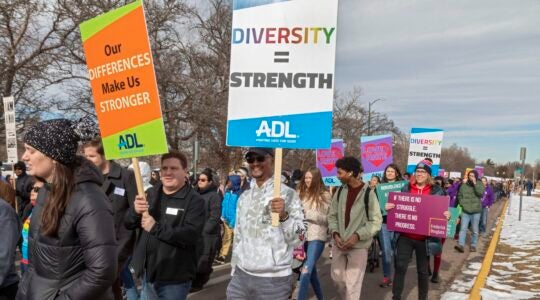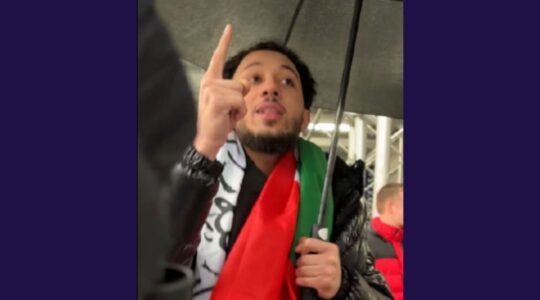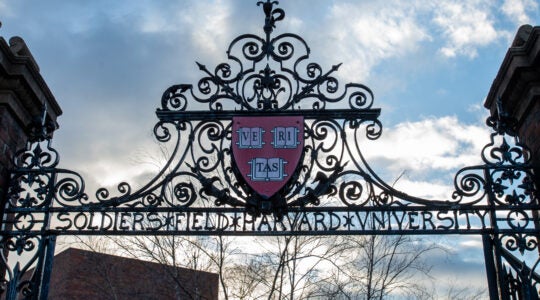One day before its meeting earlier this month, the University of Washington Board of Regents postponed a highly consequential item that was on its agenda: a vote related to an Israel divestment proposal.
But if the public university in Seattle hoped to curb disruptions at the meeting, it didn’t work.
Protesters, many of them motivated by the recent shooting death of a UW graduate by an Israeli soldier in the West Bank, still turned up to the meeting in droves to argue for divestment. They heckled and shouted down a series of Jewish speakers who sought to implore the university to do a better job protecting its Jewish students from antisemitism.
“We were called ‘genociders,’” Solly Kane, CEO of the Jewish Federation of Greater Seattle, told the Jewish Telegraphic Agency. “And again, we’re just there talking about the experiences of Jewish students who are trying to walk to class and having to walk past an encampment and having to walk past graffiti, which was a regular occurrence this past year at the university.”
The crowd became so rowdy that campus police escorted the regents, and the Jewish speakers, out through a back exit to get away from the scene. One protester unaffiliated with the university was arrested, according to a UW spokesperson.
UW’s outgoing president, Ana Mari Cauce, criticized the protesters in a statement, saying, “The freedom to express opinions fully, while knowing that some will disagree with them, is not a license to intimidate or threaten others.” The board’s outgoing and incoming chairs also condemned the protesters.
“Speakers addressing labor issues and those calling for divestment from Israel had spoken without interruption, but when Jewish speakers opposed to divestment and concerned about antisemitism on campus began their comments, protestors repeatedly interrupted and shouted them down,” they said in a statement.
The result of all the activity: Unable to restore order, the board instead made the unprecedented decision to shut down the meeting altogether.
The incident reflects a new dynamic in campus Israel activism nearly one year after Hamas’ Oct. 7 attack and the beginning of the war in Gaza. Pro-Palestinian activists, drawing comparisons to campaigns against apartheid-era South Africa, have spent years pushing universities to divest from Israel without much success. Their protests this spring caused several schools, including UW, to cut deals to at least consider divestment, often over heated objections from many Jewish groups. Now, as university boards make good on their promise to weigh the issue, protesters are escalating their activism — even as some are being invited to make presentations directly to university leaders themselves.
But unlike in Europe, no university in the United States has yet opted to divest from Israel.

Trinity College in Dublin is divesting from Israel after a student protest there, May 8, 2024. (Niall Carson/PA Images via Getty Images)
On Sunday, the trustees of Wesleyan University rejected a student-initiated divestment plan. Leading up to the vote, which had been brokered by the school’s Jewish president, pro-divestment activists occupied a university building and made unauthorized use of the school’s email system to petition alumni to “flood the inboxes” of the school’s 36 trustees.
The University of Minnesota, after allowing activists to make their case for divestment to its regents last spring, announced last month that it was taking a “neutrality” approach to its endowment, while explicitly rejecting calls to divest from Israel.
The University of Michigan and its trustees have flatly rejected divestment, though protest against members of its Board of Regents continues. In May, the president of Sonoma State University in California took a leave of absence for “insubordination” after agreeing to consider divestment; his agreement with students was voided shortly afterward.
And the University of Virginia last week announced that it would not divest from companies that do business with Israel. The surprise announcement followed a non-binding February student body vote in which a majority of voters — out of 8,000 students — said they wanted their school to divest.
The flurry of pressure around divestment isn’t limited to colleges: The city council of Portland, Maine, recently voted to divest from companies doing business with Israel, joining three other American municipalities, while countless others have rejected, tabled or rebuffed divestment calls.
But college endowments — some of the biggest privately held pots of money that can be susceptible to outside pressure — have been subject to the most intense activism on both sides of the issue. Last week the Anti-Defamation League released a report, co-authored by the pro-Israel investment activist group JLens, urging universities not to divest and claiming that the top 100 endowments would suffer losses upward of $33 billion as a result.
“Calls for universities to divest from companies doing business in Israel are not only morally dangerous, but may also be financially dangerous,” Jonathan Greenblatt, the ADL’s CEO, said in a statement. “University investment committees have a fiduciary responsibility to prudently steward institutional resources.”
Ari Hoffnung, JLens’ managing director, told JTA that the report did not assess the probability of whether any divestment campaign would succeed — only how much colleges would stand to lose if one did.
“We believe it’s crucial for university leaders and stakeholders to have a clear understanding of the potential financial implications, alongside the moral and ethical considerations,” he said.
In the closest example of a school actually divesting from something related to Israel, San Francisco State University recently declared it would redirect funds away from any company that generates at least 5% of its revenue from weapons manufacturing. The school, which is seeking to make more climate-friendly investments, did not mention Israel in its decision, and the director of SF Hillel, Roger Feigelson, told JTA that its president “was very clear she was not going to entertain discussion about BDS or Israel specifically.” (The Bay Area Jewish Community Relations Council took a more cautious view, expressing concern that pro-Palestinian activism had influenced the decision-making process.)
Additional tests of the divestment trend are expected this fall. Evergreen State University in Washington, long a stronghold of pro-Palestinian activism, agreed with protesters in May to create a committee to explore divesting from companies that “profit from gross human rights violations and/or the occupation of Palestinian territories.” Recommendations are expected by the end of the year.
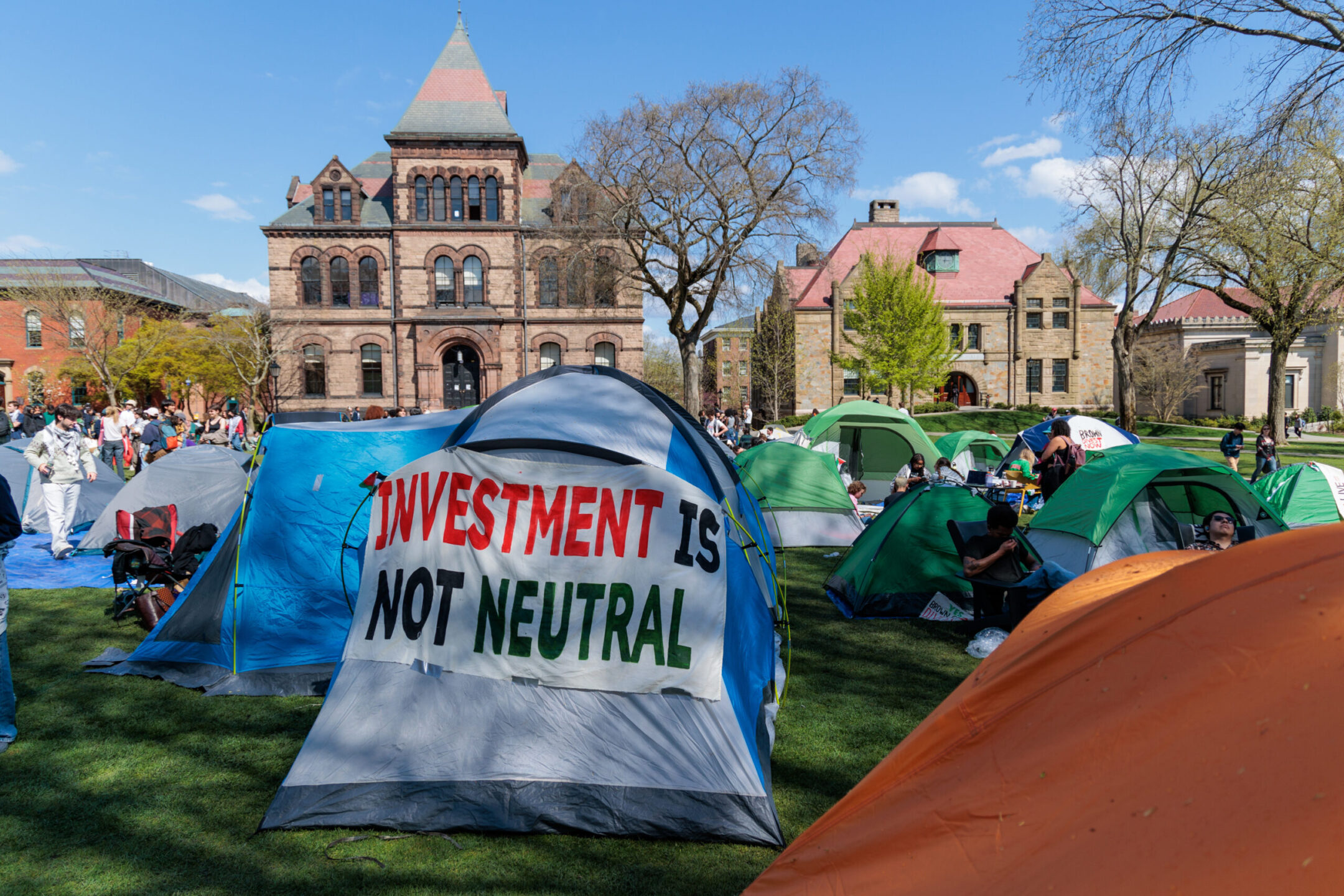
Brown University students call for divestment from their pro-Palestinian encampment on the campus’ Main Green in Providence, Rhode Island, April 24, 2024. (Anibal Martel/Anadolu via Getty Images)
Perhaps the highest-profile test will come later this month at Brown University. The Ivy League school became one of the first to strike an agreement with its encampment this spring; the agreement included a promise to hold a vote on divestment at the school’s upcoming October board meeting.
At the time of the agreement, Jewish leaders at the school were confident it would amount to nothing.
“Brown is not going to divest from Israel. Brown was never going to divest from Israel,” Rabbi Josh Bolton, director of Brown/RISD Hillel, told JTA in May.
But as the vote grows closer, and student representatives of the Brown Divest Committee have made their formal pitch for the school to divest from 10 companies with ties to Israel, anger and anxiety have risen.
“It’s not entirely clear where this vote will go,” Bolton now says.
Two dozen Republican state attorneys general recently sent a warning to the university that any Israel divestment could be in violation of state laws designed to punish Israel boycotts. Matters escalated further when a Jewish member of the Brown Corporation, the university’s governing board, resigned in protest of the vote.
“The university leadership has, for some reason, chosen to reward, rather than punish, the activists for disrupting campus life, breaking school rules, and promoting violence and antisemitism at Brown,” hedge fund manager Joseph Edelman wrote in his resignation letter.
In response, Brown President Christina Paxson, who is Jewish, argued in a Wall Street Journal letter that Edelman “unfortunately misunderstands and mischaracterizes” the school’s decision to hold the vote.
Paxson, whose financial advisory committee will be issuing its recommendation on the topic next week, said the planned vote was in keeping with Brown’s decades-old procedures for allowing “members of its community to put forth divestment proposals.” One hundred members of the university’s faculty have signed a letter backing divestment.
The university is not sharing further details about the vote, including the date it will be held, though others at the school believe it will take place in mid-October. “We don’t consider aspects of the agendas for Brown Corporation meetings public information,” spokesperson Brian Clark told JTA.
For Bolton, the mere fact that the vote is happening means that “we are already paying the price of divestment,” since protesters are celebrating the vote itself as a symbolic win. But he said he remains confident that the board will reject the actual divestment proposal.
“Divestment is being pushed by unreasonable people,” he said. “And ultimately this institution is being led by very reasonable people, who understand nuances and the complexities and the trickiness of all of this, and who are not going to sell out the school for political gain.”
JTA has documented Jewish history in real-time for over a century. Keep our journalism strong by joining us in supporting independent, award-winning reporting.
